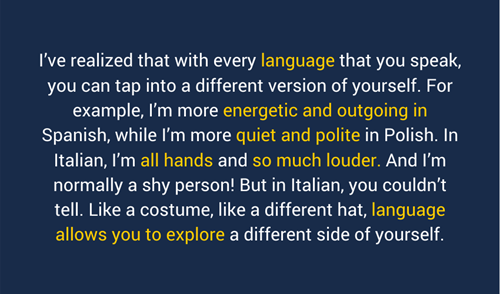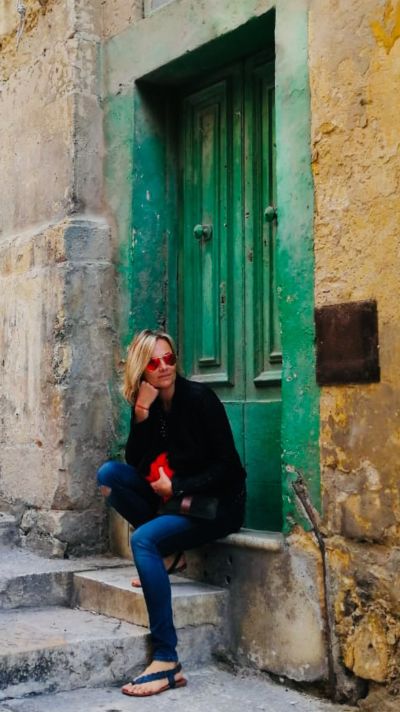1 February 2021
Easy, Fun Advice for Learning a New Language That Has Nothing to Do With Grammar
By Felicia Campbell
[6 minute read]

As a true language-lover who speaks five languages and is learning a sixth, Justyna Makowska knows a thing or two about how to make a new language stick. Makowska is the program manager for Foreign Languages and Translation and Interpretation courses at UC San Diego Extension. She’s a proud language-learning addict.
Extension’s program includes communication-driven programs in Arabic, Chinese, French, German, Italian, Portuguese, Japanese, and Spanish. Makowska is fluent or proficient in nearly all of those languages.
We sat down with her for a virtual chat about how to master a foreign tongue and some of the surprising benefits of expanding your linguistic repertoire.
 What got you interested in languages?
What got you interested in languages?
I’m originally from Poland, and there, starting from the age of eight or nine, we had to learn a foreign language. I just loved it. Hearing the different words, trying to figure out the spellings, and that moment when it all started to click. Back in the 90s, the only available cable channels were in German, and it was so much fun to watch something like Karate Kid in German and be able to understand.
Also, my dad stressed the importance of travel, which exposed me to other languages, but those German classes provided the initial spark. Then my parents made me learn English. I had a teacher from New York, and she was so incredibly charismatic. She’d traveled the world, and at 14-years-old, to me, she was the most interesting person I’d ever met. I wanted to be just like her, and that gave me another reason to go to class.
Which languages do you speak now?
Polish is my first language, but I’m also fluent in English, Spanish, Italian, and I’m gaining proficiency in Portuguese. I understand German, but I can’t really speak it anymore.
I haven’t had any reason to use it for the last twenty years until a year ago when my new boss started speaking to me in German. I could understand, but I’d lost the words to speak. Languages are “use it or lose it.” German was forced on me back in school when my only choices were Russian or German, and German seemed more exotic at the time. But since then, there have been so many other languages that I’ve had more opportunities to use!
What advice would you give to people who have a hard time with languages or think they don’t have the capacity to learn a new language?
It’s possible, but attitude is everything. I taught students who took Spanish as a required course and also students who took it for personal enrichment. The results were night and day.
My 55-year-old mom always said she couldn’t learn English, but she recently found a seniors’ class and is studying English for the first time. She’s doing great! She likes her teacher and classmates, and though she is her own harshest critic, her attitude has changed. I like to remind her that no one is expecting her to be perfect. All that matters is that she is communicating.
 Another piece of advice is to find a learning style that works best for you. That could be one-on-one tutoring, watching movies, or doing an online program. When we had to shift from in-person to online for the UCSD Extension classes, people were really nervous, but now everyone loves the new Zoom format. They can enjoy the class from the comfort of home, and it is kind of an escape, especially listening to the instructors, most of whom are native speakers. Courses at UC San Diego Extension are all communication-based, so the conversations are all in context. Not just conjugating words, but using them to get to know one another. Over the last year, for many students, these classes have become their “night out.”
Another piece of advice is to find a learning style that works best for you. That could be one-on-one tutoring, watching movies, or doing an online program. When we had to shift from in-person to online for the UCSD Extension classes, people were really nervous, but now everyone loves the new Zoom format. They can enjoy the class from the comfort of home, and it is kind of an escape, especially listening to the instructors, most of whom are native speakers. Courses at UC San Diego Extension are all communication-based, so the conversations are all in context. Not just conjugating words, but using them to get to know one another. Over the last year, for many students, these classes have become their “night out.”
You clearly have a knack for languages, but for most students, which aspects of learning are the most challenging?
For most people, the biggest hurdle is letting go of being self-conscious. I tell my students, ‘Just get over it and try to speak!’ native speakers are usually just grateful you are trying. So, don’t obsess over the little things. Get yourself to the point where you don’t care and just want to communicate.
That brings up a good point. When immersion and speaking are so vital to fluency, how can students practice if they aren’t exposed to the language they are studying in everyday life?
There are so many resources these days. Listen to podcasts, use language gaming apps, watch foreign-language movies, find magazines! Exposure is easy in that way, but the real issue is having opportunities to practice speaking, which is the most difficult part. You won’t learn to speak without practice. That said, there are plenty of websites that will connect you with native speakers via video calls. It is really affordable, so the biggest thing is simply putting in the effort. Students sometimes find that harder when the language they’ve chosen isn’t applicable to their own daily lives.
Do you feel that having a practical reason to learn a language is important?
It doesn’t have to be practical, but you need a good reason to stick to a language. I suggest choosing a language that brings you joy or that you need.
It’s easier when you have a necessity, like learning the language to use for a job or communicating with your spouse or in-laws, or maybe for visits to Mexico for us here in San Diego since we are so close to the border. Basically, if it makes your life easier.
But it also could just be something that interests you. I had a student who only started learning Portuguese because he loves Brazilian music and wanted to understand the words. He went through six levels and became really good! So try to find something related to the culture that you can really get into.
Other times, it is as simple as when you hear the language. It puts a smile on your face. Italian felt like a song to me, and I always wanted to learn it. Now it’s Japanese. I don’t understand anything, but it sounds so great!
What do you like most about the process of learning a language?
Whatever language I’m learning, I become obsessive. I listen to everything I can. Now that I speak a few languages, I have a mechanism in place. I’m currently advancing in Portuguese. When I started, I loved learning the similarities it had to Spanish and then figuring out the differences. Mostly I love the sounds. I marvel at the sounds. And, of course, I love the moment when it clicks as I’m listening to a song or watching a movie, and it feels like a wall comes down, and the curtain opens, and I suddenly have access to all the words I’m hearing.
What is your favorite word in Portuguese right now?
Cabeleireira (cah-bel-ay-ray-roo). It means hairdresser. It just rolls off the tongue so naturally.
Why do you keep learning more languages? Is there some kind of additional, secret benefit you’ve gained beyond cross-cultural communication?
Languages are my superpower, and I want to milk it. They get easier with each language because I’ve learned techniques that work for me, but I really can’t wait to learn Japanese because all the mechanisms I’ve learned won’t apply! It will be a different sentence structure, different sounds, different letters, and each detail conveys so much meaning. I can marvel at the sounds and enjoy the new challenge.
UC San Diego Extension offers courses in Arabic, Chinese, French, German, Italian, Portuguese, Japanese, and Spanish specialty programs for professionals and conversationalists. Explore a new world through language, learn more today.